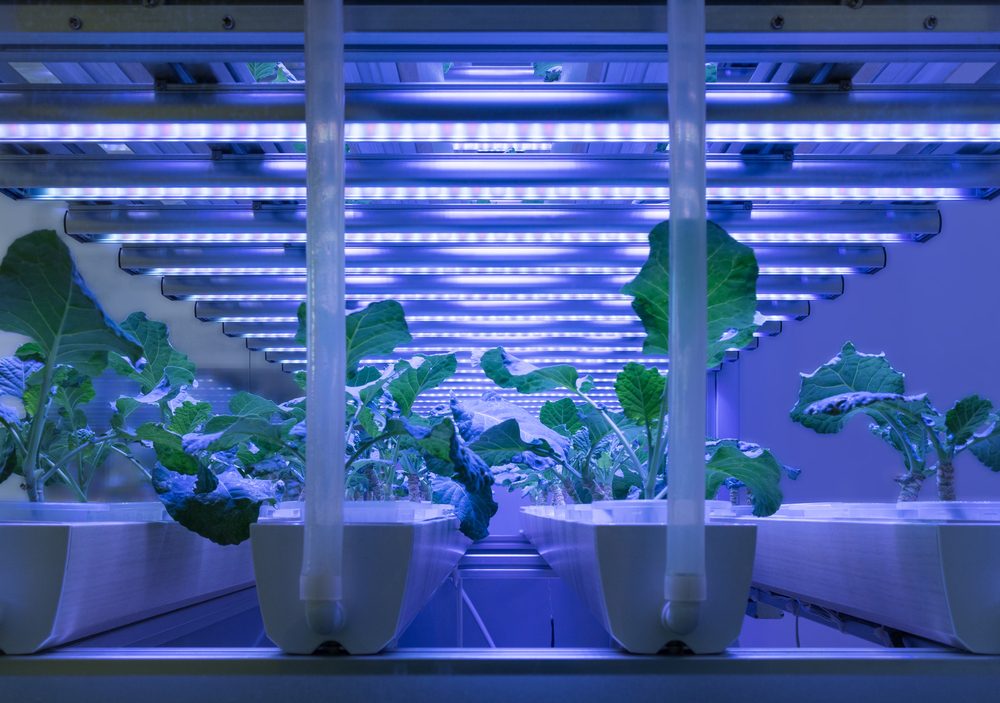At Newton, we are always on the lookout for new innovations. While we are often analysing specific companies, we also regularly conduct research to better understand industries and processes which might inform our themes through their impact on long-term trends. To this end, a group of Newton team members recently went on a visit to an underground farm in Clapham, to learn more about innovations in agriculture. Agricultural developments inform our ‘Earth matters’, ‘smart revolution’ and ‘population dynamics’ themes, as growing food scarcity and concerns over the health of the planet are sparking all sorts of new technological inventions.
This is the first underground farm in the UK.[1] It occupies a deserted World War II shelter beneath the city, and distributes food locally in London. There are many other empty bomb shelters and disused underground stations that could be repurposed with similar aims, should the project, or sustainable farming in general, expand.
The changing climate raises concerns about feeding a population which is set to continue to expand, especially when farmland is under threat from changes in temperature, weather and rainfall, along with other challenges like soil degradation. In addition, the fact that much of the food eaten within London has travelled many miles before it ever reaches people’s plates is part of what keeps the carbon footprint of agriculture unsustainably high. This small farm aims to pave the way for sustainable, local agriculture, even in the busiest of metropolises.
Underground farms have many positives when it comes to growing food: they are insulated from the weather and natural causes of soil erosion, which makes them more resilient. This is useful now, but may prove even more crucial if weather systems become more unpredictable over the coming years, as is indicated by climate-change projections. The farm owners have suggested that underground farms could produce yields of up to sixty times that of a regular farm of a similar size, as they use precision techniques and are not subject to external disruptions. However, as our visit showed, this dream is still in the early stages.
Only a garnish?
Right now, the farm only grows micro herbs, making clear that there is a way to go before these methods could be used to grow bigger vegetables and grains, let alone enough to feed a significant proportion of London’s population. While we can vouch for the deliciousness of these micro herbs, it is fair to say that they are only a garnish, not a whole meal. However, the owners of this enterprise are confident that underground farming could be scaled up to produce more food. There are definitely efficiency gains to be made: currently, much of the twelve employees’ time and efforts are spent meticulously cleaning the farm, which is necessary to keep it sterile without using industrial chemicals. The sterility is required to ensure the integrity of the resulting produce, while the lack of industrial chemicals is both to avoid polluting the herbs and protect the employees, as it would be unsafe for them to work in a small underground bunker surrounded by toxic fumes. New technology could allow the cleaning process to be sped up and streamlined, freeing up time and resources for the team to spend more time growing food and planning expansions to the project.
Additionally, there are questions about just how sustainable this sustainable farm really is. As you’d expect for an underground farm, there are a lot of lights involved, which require a lot of energy. Carpets are also burned to provide materials for the growing process, and both the farming and the packaging involve some plastic.
The company is aiming to be carbon-neutral by 2020, but, for now, underground farms still negatively affect the environment in their own way, albeit that they are more focused on sustainability than the vast majority of other companies and industries. It is clear that underground farming is very different from traditional farming, which might just be what the agricultural sector needs to continue to thrive in a world going green. However, innovations like these are only likely to be part of the solution, and not the solution to agriculture’s negative environmental impacts and uncertain future in a world of climate change. This is a very complex issue and will require innovations at all levels of the process to develop sustainably over the coming decades.
[1] http://growing-underground.com/
This is a financial promotion. These opinions should not be construed as investment or other advice and are subject to change. This material is for information purposes only. This material is for professional investors only. Any reference to a specific security, country or sector should not be construed as a recommendation to buy or sell investments in those countries or sectors. Please note that holdings and positioning are subject to change without notice.






Comments